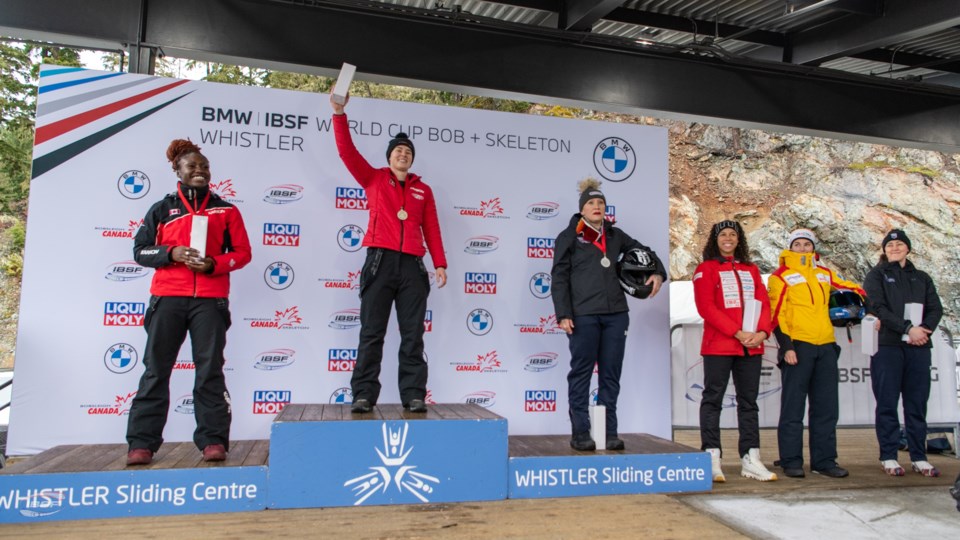Nine months after monobob made its Olympic debut in Beijing, Canadian women have written their names into the record books.
On Nov. 25, Bianca Ribi sped down the Whistler Sliding Centre’s historic track in a combined time of 1:50.89 over two runs, securing the first International Bobsleigh and Skeleton Federation (IBSF) World Cup gold medal ever awarded in monobob. Joining her on the podium was fellow Canadian national team pilot Cynthia Appiah, who clocked in at 1:51.16 for silver.
Appiah barely held off Kaillie Humphries of the United States, the inaugural Olympic monobob champion, who claimed bronze with a result of 1:51.18.
Unlike the more classic bobsleigh disciplines of two-man/woman and four-man, monobob challenges pilots to drive 162-kilogram sleds down harrowing icy tracks all by themselves. No brakewomen are there to provide more horsepower for your initial push, yet your sled weighs almost as much as a two-woman vehicle. Monobob is an exclusively female event, added to the Olympic and World Cup programs to increase female participation in bobsleigh.
Ribi is thrilled to have broken new ground in a precedent-setting sport as well as in her own career, winning gold in her first World Cup event as a pilot.
“I don’t even believe it,” she said, beaming after the race. “I was just super locked in and focused. It was my first World Cup and all I kept thinking about was: it is just me and the track.”
Appiah, a 2022 Winter Olympian who finished eighth in both monobob and two-woman in Beijing, is also pleased, though she aspires to even greater heights.
“It’s great to have a medal,” she said. “I wish I had driven a little better today. The last time I was here in Whistler was March of 2021. This should be my home track…but finishing second place here helps to build my confidence back.”
Originally from Winnipeg, Man., Ribi put her wealth of experience sliding in Whistler to good use. The first athlete on track that Friday, her opening run of 55.41 seconds had her within one one-hundredth of a second of the lead. Only Germany’s Laura Nolte, the defending Olympic two-woman champion, edged her out in the first heat (55.40).
In heat no. 2, Ribi had to wait and see if her follow-up effort of 55.48 seconds would hold up against elite competition. Nolte crashed near the bottom of the track in her next run, finishing seventh as Ribi celebrated victory.
“Besides Kaillie Humphries, I probably know this track the best,” she said. “I just needed to draw on that experience. I needed to have a good push. I needed to keep trusting my eyes and hands and execute. If I did that, I knew that I was going to be competitive. But I definitely didn’t think that it was going to land me in first place.”
Sports like bobsleigh end up pitting national teammates like Ribi and Appiah directly against one another in competition. Some may view this as unfortunate, but it can also be a source of healthy motivation.
“You’re going to be competing against the whole world, but to compete against your teammates is just a little extra ‘oomph’ that you get,” said Appiah, who is from Toronto.
Like many other bobsledders, Ribi and Appiah started out playing other sports. Ribi was a high-level soccer athlete with three years in the Canadian national program and four years of NCAA Division I soccer at Dartmouth College under her belt. After graduating with her psychology degree, Ribi still hungered to participate in elite sport but felt ready for a change.
Her father introduced her to family friend—and 2010 Vancouver Olympic bronze medallist—Lyndon Rush, who helped Ribi land a spot in the Canadian national bobsleigh program in fall 2018.
Meanwhile, Appiah first honed her athleticism in track and field as a shot putter and hammer thrower at York University. She was introduced to bobsleigh at a university testing camp in the summer of 2011 and has worked her way up the ranks ever since. Appiah started out as a brakewoman and headed to PyeongChang, South Korea as a national team alternate for the 2018 Winter Olympics before becoming a pilot.
In addition to competing, Appiah is an official athlete representative for Bobsleigh Canada Skeleton (BCS) alongside skeleton racer Mirela Rahneva.
Ribi and Appiah would go on to place fifth and sixth in the two-woman race on Nov. 26, alongside brakewomen Niamh Haughey and Leah Walkeden respectively.
Other notable results from the IBSF World Cup opener in Whistler include Team Taylor Austin’s bronze medal in four-man bobsleigh and Blake Enzie’s career-best sixth-place finish in men’s skeleton. Visit the IBSF website for more information.




